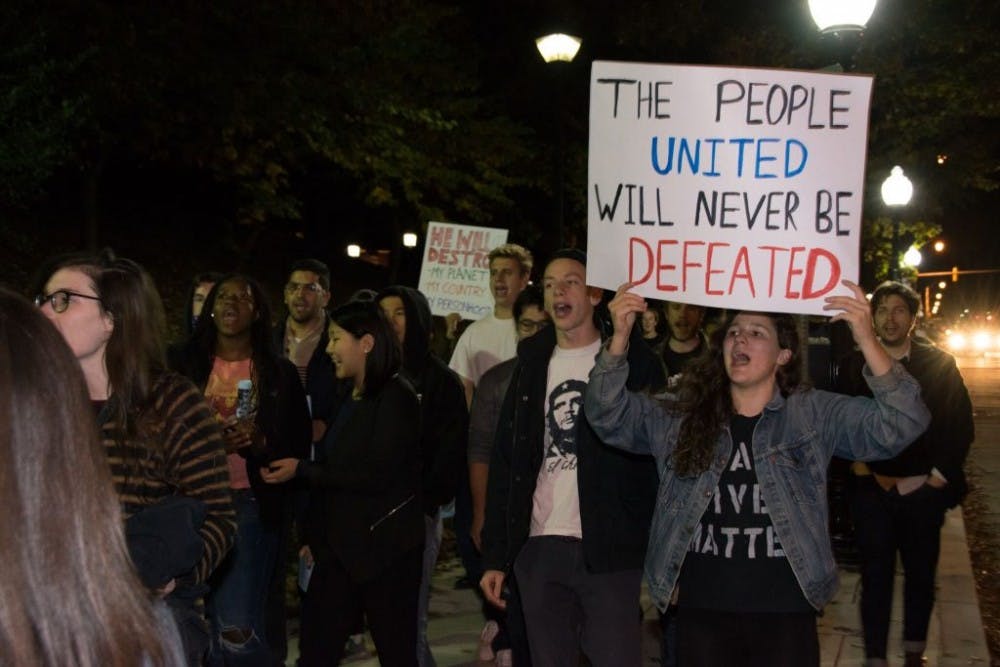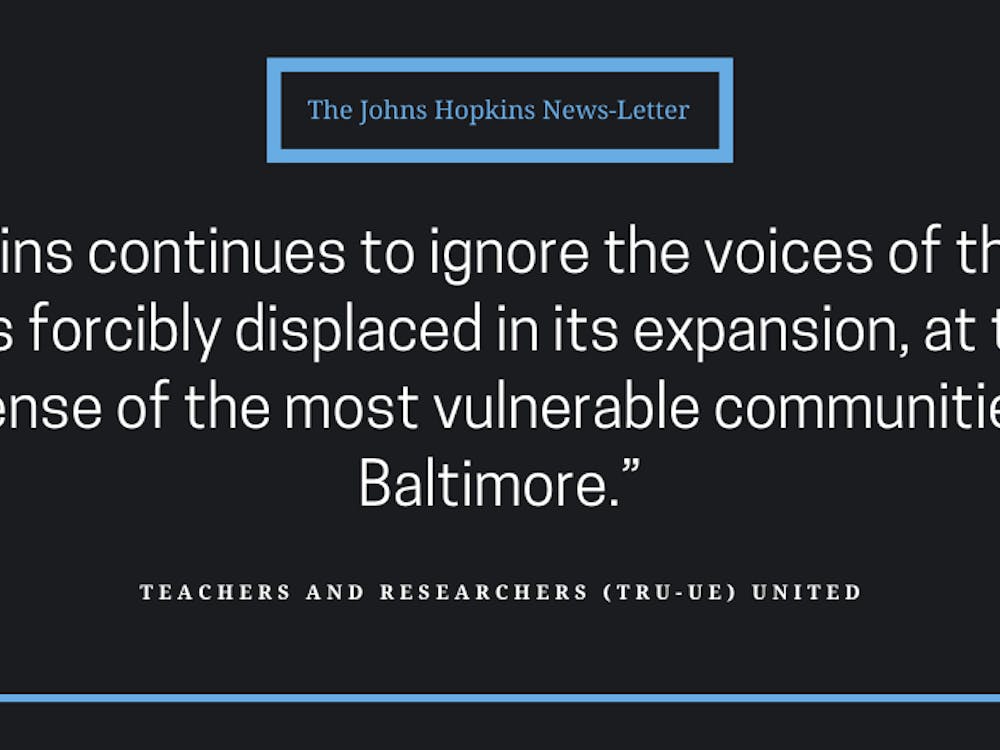One year ago, Donald Trump won the U.S. presidential election, leaving many Hopkins students in shock. They spray-painted the Blue Jay statue and the mural boards outside the Mattin Center with anti-Trump slogans. They joined a citywide protest against Trump. The University hosted sessions for students to share their thoughts and feelings. Professors spent lectures reflecting on the election, asking how the polls, which initially predicted that Hillary Clinton would win, got it all wrong.
One year later, students reflect on the impact of the 2016 presidential election and how it has changed their lives and college experiences.
Reorganizing in the wake of Trump
Last September, the College Republicans endorsed Trump in a Facebook post. Following criticism from many students, the group released a second post saying that they would not encourage anyone to vote for Trump and that people should “vote their conscience.”
Junior Joseph Klein, an executive board member for the group, said that though he and some other College Republicans opposed Trump at the time, they thought that it was necessary to let Trump voters feel supported.
“The club as a whole stands by that choice,” he said. “We defend people’s rights to choose who they want to vote for. That, in the end, is probably our most important drive.”
Klein said the College Republicans have not significantly changed the way the club has run since the election.
“We didn’t feel the need. We’re a flexible organization as is,” he said.
On the other hand, College Democrats treasurer Emma Cook said that the election led the group to reevaluate its role in the Hopkins community.
“We had a moment when we were like, ‘What can we do now? What can we do to be more receptive?’” she said.
Since the election, the College Democrats have been trying not to align themselves too closely with the Democratic Party. In doing so, they hope to accommodate a wider variety of people on the left, including non-members.
Communications Chair Kelvin Qian added that while there was no outright conflict between left-leaning students at Hopkins, there has been an increased sense of division among students since the election, particularly between supporters of Democratic nominee Hillary Clinton and Senator Bernie Sanders.
“There was a feeling of mistrust between these two factions,” he said. “Our goal of becoming more inclusive has been so important these past few months.”
Efforts to broaden their outreach included hosting a town hall and inviting both members and non-members to canvass voters.
Co-President Molly Brambil said that while such events were held before the election, they have been more frequent in the past year. Previously, the group circulated invitations to their events among a limited number of people.
“After Trump, conversation wasn’t enough because everybody was talking about [politics],” Brambil said. “It made us realize that we should be taking action.”
Engaging with opposing views
Devanshu Singh, president of the nonpartisan student group IDEAL, said that his organization’s role in facilitating dialogue between members of different political parties has grown more important.
“When Obama was president there were controversies, but things weren’t as stark and shocking and relevant to people’s lives as they are now,” he said.
Singh, who identifies as a left-leaning independent, thinks that the election made him more receptive to conservative viewpoints.
“I used to be a lot less moderate than I am right now,” he said. “The election made me more cognizant that there were people in the nation who could be very reasonable, normal people and who had opinions that I used to consider abhorrent.”
Singh believes that students have become more willing to engage in discussions with people who have opposing viewpoints, noting that some of his conservative friends have adopted more liberal perspectives in the last year.
However, junior Shelby Sprigg, a self-identified libertarian, disagrees. She said that while she was able to have friendly debates with peers prior to the election, she has grown reluctant to talk about politics.
“Now, if you don’t hold with the views of everyone else, you’re not going to say anything because then it will just be you against a mob,” she said.
Sprigg feels that she lacks a community of students with whom she can share her political views.
“I don’t know a single other conservative student,” she said.
Klein believes that due to increased political divisions on campus following the election, the College Republicans lack unity. As a result, he often has difficulty making statements on behalf of the club. Klein also expressed his frustration with having to counter assumptions that peers make about him and his views.
“It’s hard to be an outward Republican on a college campus,” he said. “A lot of people, they get harassed, they get bullied, they get talked down to in class by peers.”
Klein criticized what he sees as a “further decay of discourse,” as he believes that the media has been focusing too narrowly on the persona of Trump himself for people on both the left and right to debate productively about actual issues. In his view, politics has become much more personal and inflammatory.
“It’s just so unhealthy and so dangerous that we need to be outraged by something at all times,” he said.
Addressing hate
Shortly after taking office in January, Trump began implementing legislation that has directly impacted students at Hopkins and other college campuses. He instituted an executive order banning entry from seven Muslim-majority countries and called for an end to the Deferred Action for Childhood Arrivals (DACA) program.
Trump’s political rise has also occurred in conjunction with an increase in hate crimes and displays of white nationalism and neo-Nazism.
Jewish Students Association (JSA) President Serena Frechter said that she is uncertain whether Trump’s victory has led to a rise in anti-Semitism or whether she has simply become more conscious of it.
This year, Frechter and other Jewish students were waiting in front of a local temple for Rosh Hashanah services when a man approached them.
“He said, ‘neo-Nazis, they know what to do with you,’” Frechter said.
After filing a report with the Hop Cops, they found out that the same man had been waiting outside Hopkins Hillel the night before.
“[He] told two students that Hitler had the right idea of how to handle Jews,” she said. “Apparently a lot of people have experienced things like that... I never heard of it happening before [the election].”
She criticized Trump for failing to call out neo-Nazis for hate crimes while repeatedly expressing his respect for Jewish culture.
“It’s interesting seeing people who think we have more privilege because Trump’s family members are Jewish,” she said.
Haroon Ghori, the president of the Muslim Student Association (JHUMA), has observed growing Islamophobic sentiments within the last year. He said that several JHUMA members have been impacted by Trump’s travel ban, since their parents have been barred entry to the U.S. In addition, attacks on Muslims have increased.
“Hate crime is on the rise, and mosques, places of worship, community centers are being vandalized,” he said. “That’s a scary thought for a lot of us.”
Islamophobia is not a new phenomenon for Ghori, who has long been aware of how society perceives him as a Muslim.
“Growing up in post 9/11 America, a lot of people — myself included — feel a kind of apprehension,” he said. “What will happen if I’m on an airplane and I start speaking Arabic, or if you’re a woman and you’re walking down the street in a hijab?”
Yet other student leaders at Hopkins did not feel that their lives had been noticeably affected by Trump’s presidency.
“It was more of a wake up call than anything in terms of how to personally navigate social justice or politics,” Cook said.
The University’s role
Since Trump’s victory, the University has issued several statements promising to protect Hopkins affiliates targeted by the Trump administration, including undocumented immigrants and citizens of Muslim majority countries.
Singh feels that Hopkins has the right to take a political stance and praised administrators for fostering political engagement. However, he questioned the University’s ability to effectively respond to Trump’s new policies.
“I’ve seen the University send out a lot of emails, but I just don’t know what they can possibly do and how much they have done,” he said.
Klein said that while he respects the University’s right as a private institution to adopt political stances, he does not think it is the University’s responsibility to be politically responsive.
“That’s our responsibility as citizens,” he said. “We shouldn’t be looking to someone else to do that for us.”
An apolitical campus?
Many students characterize Hopkins as an “apolitical” campus, especially in comparison to institutions like the University of California, Berkeley, which has drawn national attention for its protests.
Sprigg believes that Hopkins students are less politically active than some institutions because left-leaning students assume everybody shares their views.
“Berkeley is a political campus because there are different groups who are willing to admit different standpoints on things,” she said.
In comparison to Berkeley, Klein said that Hopkins students were able to demonstrate in a way that did not disrupt daily life on campus.
“We’re mature people. We have a lot of other things to do,” he said.
Brambil does not believe that Hopkins is necessarily apolitical. She characterized students as “passively active.”
“It’s just a struggle to get people to take action involving themselves in politics. Especially when people are busy with studies or other activities,” she said.
Cook agreed, saying that compared to students at other universities, Hopkins students are less inclined to take collective action.
“People care individually, but there’s not the cohesion that other universities have in terms of people going beyond their individual issues and things they care about,” she said.
Singh hopes that in the following years, students will help bridge the divide between both sides of the political spectrum.
“The only way to advance your own political thought is through having discussion with someone from the opposite side instead of ignoring and branding them as radical, evil or unreasonable,” he said.
Correction: In the print edition of this article Molly Brambil's name was spelled incorrectly. The News-Letter regrets this error.























Please note All comments are eligible for publication in The News-Letter.